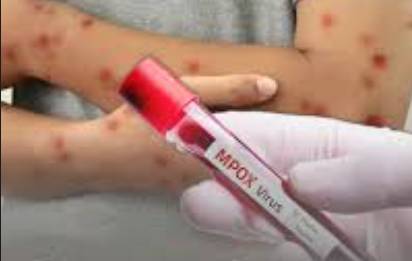- Acupuncture May Aid Cognition in Breast Cancer Survivors Medscape
- Acupuncture May Ease ‘Brain Fog’ in Breast Cancer Survivors, Trial Shows Memorial Sloan Kettering Cancer Center
- The Cognitive Struggle Is Real in Breast Cancer Survivors:…
Author: admin
-
Acupuncture May Aid Cognition in Breast Cancer Survivors – Medscape
-

Govt issues health advisory as influenza cases rise
A rise in influenza cases has prompted health authorities to issue an advisory for hospitals in Lahore. The guidelines aim to control the spread of infection and protect vulnerable groups as flu activity…
Continue Reading
-

Three more cases of monkeypox reported from Lahore
Lahore has been placed on alert after three more cases of monkeypox were reported from Mayo Hospital, 24NewsHD TV channel reporter Tuesday.
The patients were identified as Safdar 35, Tayyab 35, and Tanzeela 44. There is no isolation ward…Continue Reading
-
Operation Sindoor Showcased India’s Strength: MoS of Defence Sanjay Seth
Minister of State for Defence Sanjay Seth today said that India’s decisive action under Operation Sindoor has echoed across the world. He said this while addressing the programme organised by Veterans India to commemorate Vijay Diwas in New…
Continue Reading
-

FDA says ByHeart baby formula recall response was too slow : NPR
FILE – A sign for ByHeart, a manufacturer of organic baby formula, is displayed outside a building that houses a plant for the company on Tuesday, Nov. 11, 2025, in Portland, Ore.
Jenny Kane/AP
hide captiontoggle caption
Jenny Kane/AP
Four of the nation’s top retail stores failed to promptly pull contaminated infant formula tied to a dangerous botulism outbreak from their shelves, federal health officials said in warning letters posted Monday.
The U.S. Food and Drug Administration sent letters to leaders at Walmart, Target, Kroger and Albertsons, saying the companies continued to sell ByHeart infant formula for days or weeks, despite a Nov. 11 recall of all products in the outbreak that has sickened more than 50 babies in 19 states.
“As a participant in the supply chain, your firm should take prompt and effective action when notified of a product recall,” FDA officials said in warning letters sent to the companies on Dec. 12 and posted online Monday.
The formula was found at Target stores in 20 states “well after the recall was initiated,” one letter said. In addition, it was sold at a Target store in New Hampshire on Nov. 16, despite an electronic block on the product’s sales code, the FDA noted. And at a Target store in Arkansas, single-serve packs of ByHeart formula were promoted with a “Sale!” sign and a $2 discount from Nov. 16 to Nov. 22.
Information from state and local health officials said ByHeart formula was found at Walmart stores in 21 states from Nov. 12 to Nov. 26. The formula was found in Albertsons stores in 11 states from Nov. 12 to Nov. 19, and at Kroger stores in 10 states from Nov. 12 to Nov. 19.
In addition, the companies failed to provide FDA with evidence that corrective actions have been put in place, despite multiple requests, the agency said. The companies have 15 working days to respond to the letters.
Walmart officials said in a statement that no ByHeart formula was sold after cash registers were blocked from selling the formula following the recall.
“We moved swiftly to issue a sales restriction and removed this product from our impacted stores and clubs and online,” a company spokesperson said in an email. “We take all reports of inaction seriously and will respond to the letter.”
Albertsons officials said the company worked closely with suppliers and regulators to identify and remove the products and communicate to customers.
“ByHeart infant formula products have been removed from our store shelves,” the company said in a statement.
All of the babies in the outbreak have been hospitalized and treated with an IV medication to stop the progress of the disease. The U.S. Centers for Disease Control and Prevention expanded the outbreak to include all babies treated for botulism after consuming ByHeart formula since it was first produced in 2023.
Steven Mandernach, executive director at the Association of Food and Drug Officials, said the FDA itself was slow to distribute information about the recall with state and local food safety officials. The agency didn’t fully share product lists until Nov. 14 — nearly a week after the initial recall of two lots of ByHeart formula on Nov. 8.
He said it was “disappointing” in an outbreak involving the sole source of nutrition for vulnerable infants.
“There probably wasn’t the sense of urgency to ensure the product was off the market that I would expect,” Mandernach said.
Continue Reading
-

Christmas Decor Could Contain Badger, Toad Traces
Right now, many of us have a bit of moss sitting in our Christmas decorations at home. Some of us picked it ourselves in the forest, others bought it in a shop. But few have probably thought about the fact that moss can be full of small remains…
Continue Reading
-

‘General Hospital’ star Anthony Geary dies at 78 : NPR
Anthony Geary attends the Disney ABC panel for “General Hospital” at the Beverly Hilton Hotel, July 26, 2012, in Beverly…
Continue Reading
-

‘General Hospital’ star Anthony Geary of Luke and Laura fame dies at 78
Anthony Geary, who rose to fame in the 1970s and ’80s as half the daytime TV super couple Luke and Laura on “General Hospital,” has died. He was 78.
“We are deeply saddened by the passing of Anthony Geary,…
Continue Reading
-
Impact of obstructive sleep apnea on functional performance and muscle quality of patients with COPD
Vestbo, J. COPD: definition and phenotypes. Clin. Chest Med. 35 (1), 1–6. https://doi.org/10.1016/j.ccm.2013.10.010 (2014).
Cruz, M. M. & Pereira, M. Epidemiology of chronic obstructive…
Continue Reading
-

John Van Der Wielen appointed Gold Corporation chair
- Former Crown Perth chair and HBF chief executive
to chair The Perth Mint - John Van Der Wielen succeeds Sam Walsh in role
- Appointment heralds new era for Gold Corporation
under strengthened legislation
Mines and Petroleum
Minister David Michael today announced the appointment of John Van Der Wielen
as the new non-executive chair of Gold Corporation, the operator of The Perth
Mint.Mr Van Der Wielen will
assume the role on 1 January 2026 for an initial two-year term.He succeeds Sam Walsh,
who has left Gold Corporation after nearly seven years of service.Mr Van Der Wielen joins
Gold Corporation following a distinguished career of more than 30 years across
business, health insurance, banking and wealth management which included the
international markets of London, Hong Kong, Singapore and Luxembourg.Notably he previously served
as HBF chief executive for more than five years and Crown Perth chair for more
than three years.He is also the current
chair of ASX-listed regenerative medicine company Orthocell and chairs the WA
Government’s Future Health Research and Innovation Fund.Mr Van Der Wielen’s appointment is timely as Gold
Corporation enters a new era under new legislation aimed at standardising and
strengthening governance and oversight.The Gold Corporation Amendment Bill 2025
will bring Gold Corporation in line with other Government Trading Enterprises
by updating and standardising its strategic planning, financial management and
corporate governance practices.Comments attributed to Mines and Petroleum Minister David Michael:
“I congratulate Mr Van
Der Wielen on his appointment and look forward to working with him as Gold
Corporation enters a new era under strengthened legislation aimed at improving
governance and oversight.“Mr Van Der Wielen brings
a wealth of expertise and experience to the role, including important knowledge
and capabilities in corporate governance and anti-money laundering.“He chaired Crown Perth post
the Royal Commission into the groupand managed the full remediation and
successful re-issue of its casino licence working with the independent monitor
appointed by the WA Government.“I would also like to thank Sam Walsh for his
dedicated and professional service on the board of the Gold Corporation over
nearly seven years.“Sam led the organisation through some
challenging times and was instrumental in overseeing The Perth Mint’s
Anti-Money Laundering Remediation Program, which addressed systems and
processes to fix historical non-compliance issues.”Continue Reading
- Former Crown Perth chair and HBF chief executive